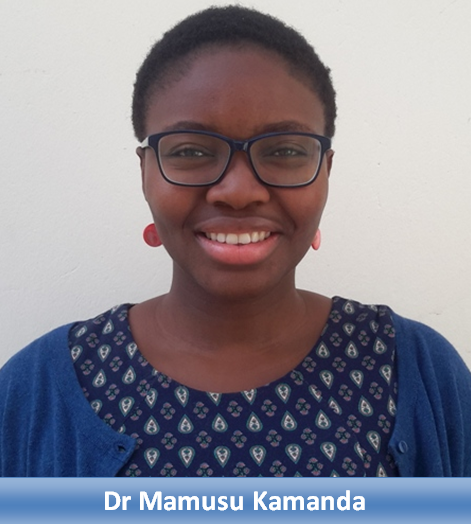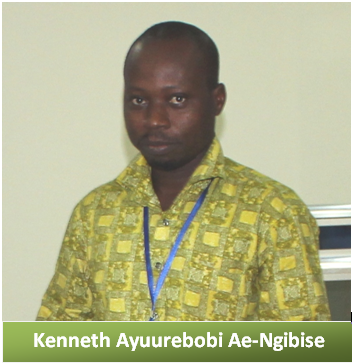Friday Newsletter from the Secretariat
3rd October 2014
|
Dear Centre Leaders,
Greetings from the INDEPTH Secretariat. We hope you have had a good week.
We have three items for your attention this week:
1. Dr Mamusu Kamanda joins INDEPTH
Dr Mamusu Kamanda, 26, is the newest member of the INDEPTH Network in Accra, Ghana. She has been employed as a postdoctoral research fellow to join the INDEPTH's Scientific Research and Co-ordination Section, focusing on the Education Programme of the Network.

Prior to joining INDEPTH, Dr Kamanda was at the University of Southampton in the United Kingdom where in December 2013 she successfully completed a PhD in Social Statistics. Her Thesis was on “Primary and secondary school attendance in West Africa” supervised by Prof. Nyovani Madise, an affiliate of the INDEPTH Network.
At Southampton, she completed a Bachelors in Sociology and Social Policy (2006-2009) and a Masters in Social Statistics (2009-2010). She then worked from January to September 2014 as a Senior Research Assistant at the University of Southampton before accepting this position at INDEPTH.
"My main research activities have focused on education and child health/wellbeing in sub-Saharan Africa. I am particularly interested in children’s primary and secondary school attendance as well as achievement in poor and post-conflict contexts. I am also interested in the application of advanced statistical models to quantitative data in both cross-sectional and longitudinal forms," she said.
She has also worked on a number of education projects with the United Nations Education Scientific Cultural Organisation in Ghana as an intern for three and a half months as well as with the United Nations Children’s Fund in Lesotho on a consultancy which explored poverty and well-being among children in the country.
"At INDEPTH, I hope to further my training and expertise in educational research. Particularly, I hope to better understand how household and community contexts affect the intersection of health, poverty and gender in affecting children’s schooling prospects and the formation of human capital," Dr Kamanda said.
2. Training opportunities
Please find below some external training opportunities.
- International Advanced Studies in Demography (IDEM)
International Advanced Studies in Demography (IDEM) winter semester 2014/15 courses at the Max Planck Institute for Demographic Research (MPIDR) in Rostock, Germany.
Deadline for applications: 10 October 2014
For details check: http://tinyurl.com/goipm2015
- Training Workshop on M&E of Population Health & Nutrition Programs
Regional Training Workshop on Monitoring and evaluation of population, health and nutrition programs, Bangkok, Thailand.
Deadline for applications: 24 October 2014
Workshop information and application forms are accessible at: www.ipsr.mahidol.ac.th
The Centre for Research in Demography and Societies of the Catholic University of Louvain – Belgium (www.uclouvain.be/demo) informs of the launch of the "MOVE-IN Louvain" call for postdoc fellowships by the Université catholique de Louvain (www.uclouvain.be). These fellowships – for a period of 12 to 24 months – are addressed to researchers who have not stayed or worked in Belgium for more than 12 months over the last 3 years. Priority is given to the following areas of research: Internal and international migrations, Fertility and family, Health, mortality, ageing, Population and environment, and Cross-cutting themes.
Deadline for applications: 07 November 2014
Further information on this call and application forms are available at: http://www.uclouvain.be/en-477969.html (English version).
3. Meet our graduates from the INDEPTH-funded MSc Programme at the University of the Witwatersrand, Johannesburg, South Africa
This series of short profiles is to introduce the more than 30 HDSS scientists who have been funded by INDEPTH to pursue the MSc in Population-based Field Epidemiology at the University of the Witwatersrand in Johannesburg. Scholarships for this programme have been graciously provided by Sida, Rockefeller Foundation and the Gates Foundation.
More information on the INDEPTH Scientific Development and Leadership Programme can be obtained by clicking on the following link: Leadership Programme.
Meet Kenneth Ayuurebobi Ae-Ngibise of the Kintampo Health Research Centre, Ghana.
Full Name: Kenneth Ayuurebobi Ae-Ngibise
Position before the programme: Assistant Research Officer, Kintampo Health Research Centre, Ghana.
Current Position: Research Fellow/Project Manager (Ghana Randomised Air Population and Health Study), Kintampo Health Research Centre, Ghana.
Student years at Wits University: 2008 - 2009
Host HDSS centre for the field attachment: Rufiji HDSS, Tanzania
"I will recommend this master’s programme for “all individuals” who want to pursue research as a career. This is because the programme covers all aspects of research with its wide-range courses that are taught theoretically and practically by professional lecturers" Kenneth said. 
He said students are properly taught to conduct research projects from beginning to the end. These lessons, he notes, relates to expertise in such areas as Epidemiology, Biostatistics, Demography, Leadership and Data Management.
According to Kenneth, he had developed the following qualities and skills because of the influence of the Wits MSc programme:
- Experience in quantitative and qualitative research in Epidemiology and Biostatistics.
- Meticulous literature search, a thorough and succinct presentation of ensuing review proposals or final research reports.
- Extensive experience of using appropriate analytical and statistical techniques and procedures in data analysis.
- Experience of using computers, for example, Microsoft word, Excel, Power Point, SPSS, clinical software, NVivo, MaxQDA and STATA for data manipulation and analysis.
- Ability to collaborate effectively with colleagues in a team.
- Ability to work autonomously, under pressure and meet deadlines.
He had his fieldwork attachment at the Rufiji Health and Demographic Surveillance Site in Tanzania and his topic was “Risk factors and trends in injury mortality in Rufiji Health and Demographic Surveillance System” which was eventually published. In this study, men were more likely to die from injuries compared with women and the main cause of injury mortality in the area was road traffic accidents.
On his experience in contributing to research projects and publications, he said he had contributed to the preparation of successful grant applications and small research projects at the Kintampo Health Research Centre.
"I have been actively involved in nine publications in reputable peer reviewed journals and also serving as an external reviewer for the Agricultural Science Research and the African Health Sciences Journals. I am currently working on four manuscripts for publication" he said.
"I am highly indebted to my sponsor, the INDEPTH Network for the award of the scholarship which enabled me to undertake this MSc programme at the University of the Witwatersrand. I render my sincere appreciation to my supervisors, Dr. Honorati Masanja, (Ifakara Health Institute) and Dr. Ronel Kellerman,(School of Public Health of the University of the Witwatersrand), as well as all the administrative staff of the Wits University for their support and guidance throughout the successful completion of my studies" Kenneth added.
He also thanked his colleagues, the INDEPTH students of 2008/9 year batch of the Population-Based Field Epidemiology programme for "all the ups and downs that we shared."
Below are his publications:
- Ae-Ngibise, K., Cooper, S., Adiibokah, E., Akpalu, B., Lund, C., Doku, V. & Mhapp Research Programme, C. 2010. 'Whether you like it or not people with mental problems are going to go to them': a qualitative exploration into the widespread use of traditional and faith healers in the provision of mental health care in Ghana. Int Rev Psychiatry, 22, 558-67.
- Ae-Ngibise, K. A., Masanja, H., Kellerman, R. & Owusu-Agyei, S. 2012. Risk factors for injury mortality in rural Tanzania: a secondary data analysis. BMJ Open, 2-6.
- Akpalu, B., Ae-Ngibise, K., Agbokey, F., Adeji, G. & Enuameh, Y. 2014. Association between Plasmodium falciparum malaria and the mental disorders in children between five and 19 years in sub-Saharan Africa: a systematic review. The JBI Database of Systematic Reviews and Implementation Reports, 12, 133-165.
- Akpalu, B., Ae-Ngibise, K., Agbokey, F., Adjei, G. & Enuameh, Y. 2012. Association between Plasmodium falciparum malaria and the mental health of children between five years and nineteen years in sub-Saharan Africa: A systematic review. The JBI Database of Systematic Reviews and Implementation Reports, 10, S91-S104.
- Akpalu, B., Lund, C., Doku, V., Ofori-Atta, A., Osei, A., Ae-Ngibise, K., Awenva, D., Cooper, S., Flisher, A. J. & Consortium, M. R. P. 2010. Scaling up community-based services and improving quality of care in the state psychiatric hospitals: the way forward for Ghana. Afr J Psychiatry (Johannesbg), 13, 109-15.
- Doku V, Ofori-Atta A, Akpalu B, Read U, Osei A, Ae-Ngibise K., Awenva D, Lund C, Flisher A, Petersen I, Bhana A, Bird P, Drew N, Faydi E, Funk M, Green A, Omar M. A situation analysis of mental health policy development and implementation in Ghana (2008).
- Kamuyu, G., Bottomley, C., Mageto, J., Lowe, B., Wilkins, P. P., Noh, J. C., Nutman, T. B., Ngugi, A. K., Odhiambo, R., Wagner, R. G., Kakooza-Mwesige, A., Owusu-Agyei, S., Ae-Ngibise, K., Masanja, H., Osier, F. H., Odermatt, P., Newton, C. R. & Study Of Epidemiology Of Epilepsy In Demographic Sites, G. 2014. Exposure to multiple parasites is associated with the prevalence of active convulsive epilepsy in sub-saharan Africa. PLoS Negl Trop Dis, 8, e2908.
- Kariuki, S. M., Matuja, W., Akpalu, A., Kakooza-Mwesige, A., Chabi, M., Wagner, R. G., Connor, M., Chengo, E., Ngugi, A. K., Odhiambo, R., Bottomley, C., White, S., Sander, J. W., Neville, B. G., Newton, C. R., Group, S. W., Twine, R., Gomez Olive, F. X., Collinson, M., Kahn, K., Tollman, S., Masanja, H., Mathew, A., Pariyo, G., Peterson, S., Ndyomughenyi, D., Bauni, E., Kamuyu, G., Odera, V. M., Mageto, J. O., Ae-Ngibise, K., Akpalu, B., Agbokey, F., Adjei, P., Owusu-Agyei, S., Kleinschmidt, I., Doku, V. C., Odermatt, P., Nutman, T., Wilkins, P. & Noh, J. 2014. Clinical features, proximate causes, and consequences of active convulsive epilepsy in Africa. Epilepsia, 55, 76-85.
- Ngugi, A. K., Bottomley, C., Kleinschmidt, I., Wagner, R. G., Kakooza-Mwesige, A., Ae-Ngibise, K., Owusu-Agyei, S., Masanja, H., Kamuyu, G., Odhiambo, R., Chengo, E., Sander, J. W. & Newton, C. R. 2013. Prevalence of active convulsive epilepsy in sub-Saharan Africa and associated risk factors: cross-sectional and case-control studies. The Lancet Neurology, 12, 253-263.
Thank you.
Have a restful weekend!
Becky Kwei
|
|
Policy Engagement and Communications
INDEPTH Network Secretariat |
INDEPTH Network, 38 & 40 Mensah Wood Street, East Legon; P.O. Box KD213 Kanda, Accra, Ghana |
|
|


